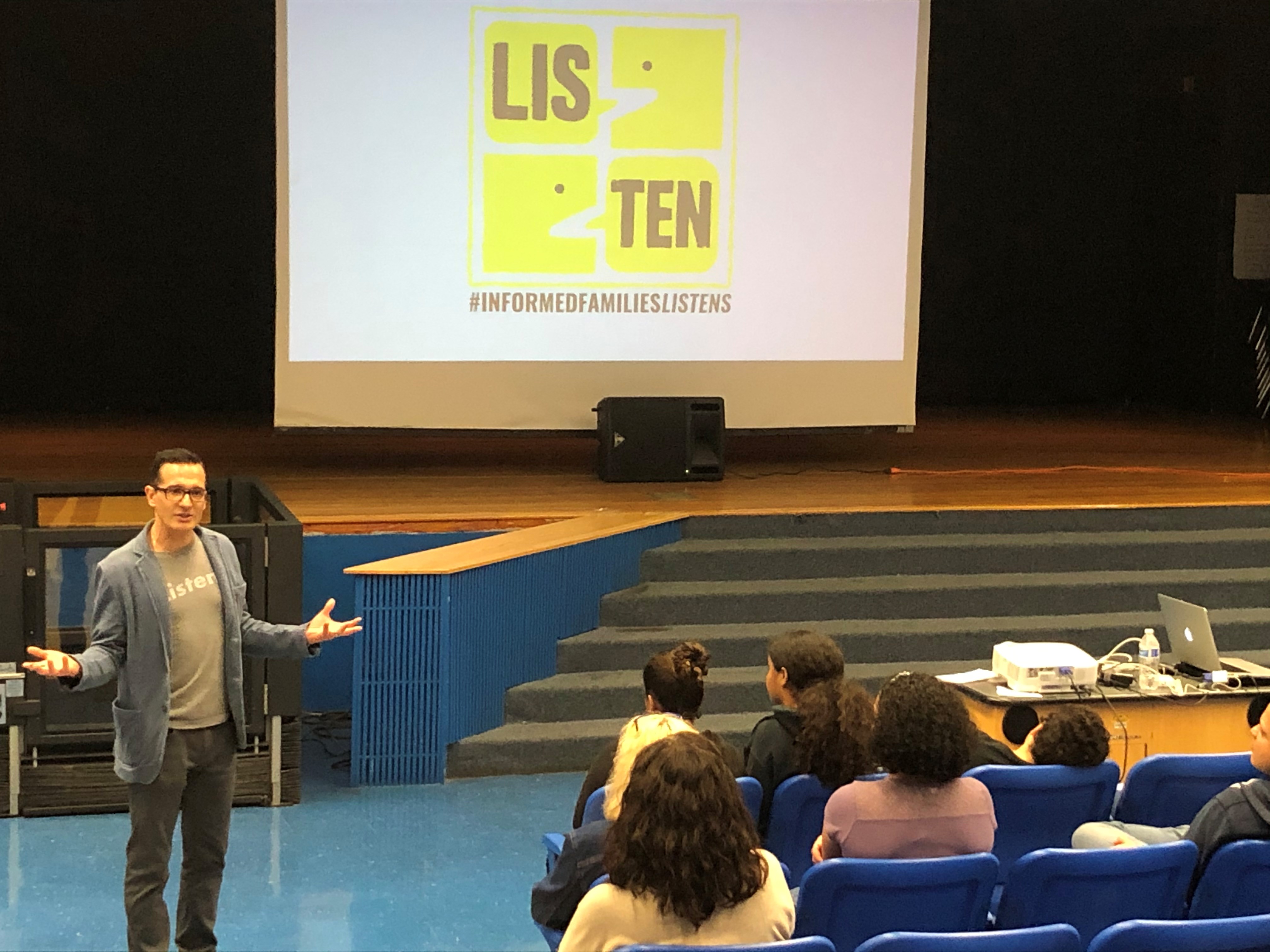Participating in Dry January as a family is a powerful way to kick off the new year with healthier habits and stronger connections. By committing to a month without alcohol, families can support each other, grow closer, and discover new ways to have fun together. Here's how families can make the most of Dry January while building a foundation for a healthier lifestyle.
Informed Families Catalyst
How Families Can Support Each Other in Dry January
Posted by Informed Families on January 27, 2025 at 4:02 PM
Topics: communication, alcohol, Informed Families, alcohol use, dry january, mocktails, mindfullness
Since the onset of the coronavirus pandemic, health officials have noted an alarming increase in the use of drugs and alcohol, suicides, anxiety, and other mental health disorders.
Topics: communication, children, Covid-19, routines
National Family Day is on the Fourth Monday of September - that's September 28, 2020 this year. It’s a great opportunity for families to eat dinner together. Watch this 1 in video to learn more about why you should engage in regular family dinners.
Parents are often surprised to hear that something as simple as eating dinner together 4 times a week can reduce the likelihood that their kids will engage risky behavior. Parental engagement is the single most potent weapon in preventing substance use among youth. Check out our Family Days Activity Guide for ideas on how to turn dinner time into something everyone looks forward.
Topics: Family Day, tips, parent involvement, positive parenting, communication, family bonding, children, Informed Families, drug prevention, Family Table Time
Worried About School in the Fall? Family Table Time Can Help
Posted by Informed Families on July 22, 2020 at 9:00 AM
Informed Families/Florida Family Partnership is teaming up with Family Table Time to help families bond, communicate better and deal with difficult scenarios.
Back to school time is a stressful time for many families. With schools reopening for the first time since March or continuing remote learning, many families are more anxious than usual. Family Table Time’s unique, dinner table conversation starter toolkit can help families better navigate this stressful time together. Conversation starters for the month of August include Back to School and Fears & Anxiety.
Topics: positive parenting, communication, family bonding, Covid-19, Family Table Time
Americans continue to celebrate essential workers keeping the country going during the coronavirus pandemic. McDonald's provided essential workers with free 'Thank You Meals'. Starbucks offered all front-line responders a free tall brewed coffee.Give Essential, a new nonprofit that boxes up people's extra household items to donate to those on the front line, was recently profiled on ABC News (see the coverage here). We are continuing to demonstrate our capacity to come together and support others during these unprecedented times.
Informed Families, the National Family Partnership and Family Table Time are also saying thanks and giving it up for front-line workers. While families are away from the office and school, these heroes put their health on the line to keep us safe, happy and healthy. When you buy a six-month subscription to Family Table Time, the family of an Essential Worker will receive a six-month subscription for free. You can designate the family to receive this gift or select an option to send it to an essential worker who needs it.
Topics: positive parenting, communication, family bonding, Covid-19, Family Table Time
Orginally published in Miami Kids magazine.
Summer is finally here! We are all ready for a much needed break from homeschooling, and looking forward to some fun. However a less structured day, and minimal supervision can spell trouble for some kids and teens.
“It’s hard to keep tabs on your kids in the summer. Having family rules are essential all year, but perhaps even more so during the summer. They help keep kids, especially teens, out of trouble and give parents a little bit of peace of mind that their kids know guidelines exist and hopefully will be followed,” said Peggy Sapp, Informed Families President and CEO.
Establishing family rules are important. What are your rules? If you want to learn how to set and establish rules, contact Mery Dominguez at mdominguez@informedfamilies.org or 305-856-4886 about joining an Informed Families’ Parent Peer Group.
Spending time together as a family is great too. If you are looking for some ideas, don’t worry we have got you covered. Check out the list of activities of family-friendly summer activities below.
Topics: tips, parent involvement, positive parenting, communication, family bonding, children, Informed Families, family rules, drug prevention, summer, healthy kids
With marijuana being legalized in more and more states, many teens now believe it's safe for them to use. But evidence shows it's not. Make sure you and your kids can separate fact from fiction when it comes to marijuana.
MYTH: It’s safer than alcohol
FACT: Alcohol and marijuana are both associated with serious problems, especially if used by teens and young adults under age 21 – when the brain and body are still rapidly developing.
MYTH: It’s okay to drive while high
FACT: After alcohol, marijuana is the drug most often found in the blood of driver’s involved in crashes.
Topics: marijuana legalization, marijuana, communication, teenagers, teens, drugs, drug use, myths
A small girl at Redland Middle School waited patiently for the other students surrounding filmmaker Erahm Christopher to leave so she could ask one question: What is the time of tonight’s screening? I really want my Mom to come and see the film.
Informed Families partnered with Mr. Christopher to host a screening of his film LISTEN at Redland Middle School on February 6, 2020. Themes covered in the film include bullying, cyber bullying, racism, gang violence and suicide. Following the screening, students had a chance ask Mr. Christopher questions and voice their thoughts and feelings about the issues featured in the film. The response was overwhelming.
According to Soraya Herran, a guidance counselor at Redland Middle School, the next day “the students couldn’t stop talking about the film and discussion they had participated in.”
Topics: communication, teenagers, middle school, teens, Peggy Sapp, drugs, drug use, mental health, suicide, Erahm Christopher
President's Message - September 2019
Posted by Peggy B. Sapp, President & CEO on August 30, 2019 at 9:00 AM
An Easy Way to Improve Parent-Child Communication
Do you want to stop school violence and a host of other dangerous behaviors? Eat dinner with your children.
Did you know if you eat dinner together as a family four times a week that your kids are 50% less likely to use drugs and engage in other risky behaviors?
Many people think they don’t have time to eat dinner with their children – well just imagine how much time you will spend sorting out your child’s problem behaviors? And guess what, some behaviors become chronic and don’t get sorted out so you will be living with them for a life time.
Eating dinner together provides an opportunity for family members to come together, strengthen ties and build better relationships. Communicating early and often makes it much easier to tackle conversations around tough topics, like substance use, when the time comes. If your kids aren’t used to talking to you about their day when they are 8 or 10 years old, it's much harder to start at age 12-14.
Our Family Day campaign promotes frequent family dinners as a way to prevent risky behavior in kids. On September 23rd, join millions of families across the U.S. to Stand Up for Sitting down to dinner. Enjoy a meal together with your family and talk to each other, electronics-free.
Peggy
Topics: Family Day, President's Message, communication, prevention, family bonding, parents, family dinner
President's Message - April 2019
Posted by Peggy B. Sapp, President & CEO on April 26, 2019 at 3:00 PM
Communicating Across Generations
I recently read that some families now have five living generations. Imagine that. Each generation has a totally different world view and processes information in a different way. However simply engaging with others remains the key to communicating effectively.
Topics: President's Message, parenting, communication, safe homes smart parties, underage drinking, teens, peer pressure, parents, alcohol use, alcohol abuse









